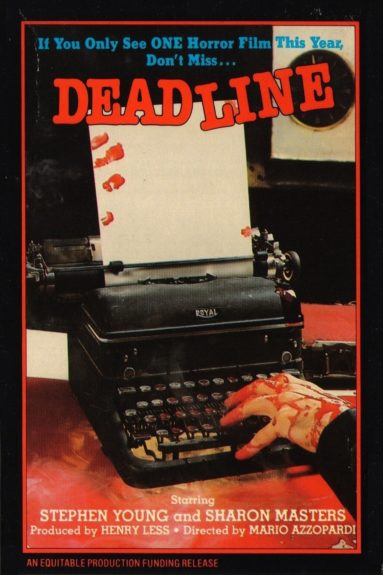 This Canadian gore-fest from the tax shelter era was a favorite of the late Chas. Balun, who championed it tirelessly in the pages of Deep Red magazine and elsewhere. I say it’s entirely appropriate to begin a review of the film with a mention of Balun, as he’s single-handedly responsible for the small cult following it currently enjoys (even Stephen Bissette, who discussed DEADLINE at some length in his popular 2020 tome THE BROOD, made sure to name drop Balun).
This Canadian gore-fest from the tax shelter era was a favorite of the late Chas. Balun, who championed it tirelessly in the pages of Deep Red magazine and elsewhere. I say it’s entirely appropriate to begin a review of the film with a mention of Balun, as he’s single-handedly responsible for the small cult following it currently enjoys (even Stephen Bissette, who discussed DEADLINE at some length in his popular 2020 tome THE BROOD, made sure to name drop Balun).
DEADLINE, in other words, was not a success by any means, having fallen into immediate, and largely permanent, obscurity. There is, frankly, a cogent reason for its failure with audiences, but the film is halfway worthwhile—meaning its first half is provocative and compelling, and its second not so much.
Steven Lessey is a successful horror novelist (patterned, evidently, on a certain real-life novelist bearing a similar-sounding first name) dealing with widespread accusations of exploitation in addition to family strife. Intercut with this are depictions of a young woman drowning in blood emitting from her shower nozzle, a guy ground up in a wheat thresher, two little kids immolating their grandmother, fetuses committing suicide in their mother’s womb, a bishop cannibalized by nuns and a guy’s stomach bursting at a punk concert, all of which come directly from Steven’s disturbed imagination (and in one case from a film adapted from his work).
Things go completely awry for Steven when his two sons, imitating a passage from one of his books, hang their little sister. His wife leaves him and Steven falls into a drunken stupor, inviting several whores to his house to watch a movie adapted from his fiction, at which point he’s forced to confront his demons.
A pleasant watch this isn’t. The copious gore aside, all the characters, Steven included, are bitchy and unpleasant. What keeps the viewer riveted (for the first half at least) is the way in which Steven’s morbid imaginings are intercut with the main action without any seeming reason, and feature never-seen-again characters who are developed to the point of having reasonably complex backstories (not unlike chapters in a horror novel in which subsidiary characters are introduced only to be immediately killed off). This would appear to suggest that the filmmakers were trying to maintain audience attention through gratuitous gore, not unlike the accusations lobbed at Steven. It’s left up to the viewer to discern whether the filmmakers’ intentions in these scenes are artful or exploitive, although what this approach undoubtedly is is interesting and unique, establishing a tug-of-war between fiction and reality.
That dichotomy, unfortunately, is resolved in an extremely conventional manner. Arguments about artistic responsibility are voiced in the form of Steven dithering with an actress on a film being made from one of his books—a poor choice, as books and film adaptations are entirely different animals—and the rather obvious device of having his children imitate the outrages described in his fiction. The proceedings also grow quite misogynistic in the final scenes, with Steven physically abusing several women who in turn destroy his house.
The acting, as is often the case with English language Canadian films, could be a bit stronger overall, although Stephen Young is solid in the lead role (it’s not his fault that the character is so unlikeable). Also featured is the young Cindy Hinds, who essentially plays the same role she did in David Cronenberg’s THE BROOD: a winsome little girl forced to contend with an increasingly twisted grown-up world.
Vital Statistics
DEADLINE
Horror Picture Films/Canadian Film Development Corporation
Director: Mario Azzopardi
Producer: Henry Leesenry Lee
Screenplay: Mario Azzopardi, Dick Oleksiak
Cinematography: Fred Guthe
Editing: Harvey Zlatarits, Gary Zubeck
Cast: Stephen Young, Sharon Masters, Marvin Goldhar, Jeannie Elias, Cindy Hinds, Phillip Leonard, Tod Woodcroft, Carole Pope, Rough Trade (band)
